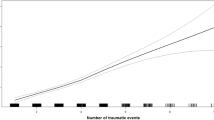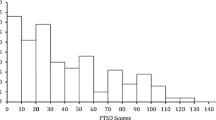Abstract
The aim of this study was to investigate symptomatology and diagnoses of PTSD and subthreshold PTSD and the screening properties of the Harvard Trauma Questionnaire (HTQ) within a sample of Dari-speaking women of refugee background receiving antenatal care. This cross-sectional study administered the HTQ to 52 Dari-speaking women at a public pregnancy clinic. The trauma module from the Structured Clinical Interview (SCID-5) was administered. Interview material was presented to an expert panel, blinded to the HTQ screening results, in order to achieve consensus diagnoses of PTSD using Diagnostic and Statistical Manual of Mental Disorders 5 (DSM-5) criteria. Three women (5.8%) met DSM-5 criteria for PTSD. Eleven women (21.15%) met criteria for subthreshold PTSD, defined as meeting two or three of the DSM-5 criteria domains. A comparison of HTQ cut-off scores was conducted and a score of ≥ 2.25 on the HTQ demonstrated excellent sensitivity 1.00 (95% CI 0.29–1.00) and specificity 0.76 (95% CI 0.61–0.87) in detecting PTSD; however, a wide confidence interval for sensitivity was found. A cut-off score of ≥ 2 provided the best balance of sensitivity 1.00 (95% CI 0.72–1.00) and specificity 0.80 (95% CI 0.65–0.91) when assessing for subthreshold PTSD. Screening for perinatal PTSD for women of refugee background is recommended, in order to identify those at risk of DSM diagnosis and also those women experiencing distressing PTSD symptomatology.
Similar content being viewed by others
Code availability
Not applicable.
References
Altman DG, Bland JM (1994) Diagnostic tests. 1: Sensitivity and specificity. BMJ 308:1552. https://doi.org/10.1136/bmj.308.6943.1552
Altman DG, Bland JM (1994b) Diagnostic tests 2: Predictive values. BMJ (Clin Res Ed) 309:102–102. https://doi.org/10.1136/bmj.309.6947.102
Anderson FM, Hatch SL, Comacchio C, Howard LM (2017) Prevalence and risk of mental disorders in the perinatal period among migrant women: a systematic review and meta-analysis. Arch Womens Ment Health 20:449–462. https://doi.org/10.1007/s00737-017-0723-z
American Psychiatric Association (2013) Diagnostic and statistical manual of mental disorders. Arlington
Austin M-P, Highett N, Committee GEA (2011) Clinical practice guidelines for depression and related disorders — anxiety, bipolar disorder and puerperal psychosis — in the perinatal period. A guideline for primary care health professionals. cope.org.au/wp-content/uploads/2013/12/Perinatal-Mental-Health-Clinical-Practice-Guidelines.pdf. Accessed on 22 June 2020
Berthold SM, Mollica RF, Silove D, Tay AK, Lavelle J, Lindert J (2019) The HTQ-5: revision of the Harvard Trauma Questionnaire for measuring torture, trauma and DSM-5 PTSD symptoms in refugee populations. Eur J Public Health 29:468. https://doi.org/10.1093/eurpub/cky256
Blackmore R, Boyle JA, Fazel M, Ranasinha S, Gray KM, Fitzgerald G, Misso M, Gibson-Helm M (2020) The prevalence of mental illness in refugees and asylum seekers: a systematic review and meta-analysis. PLOS Med 17:e1003337. https://doi.org/10.1371/journal.pmed.1003337
Blackmore R, Gibson-Helm M, Melvin G, Boyle JA, Fazel M, Gray KM (2021) Validation of a Dari translation of the Edinburgh Postnatal Depression Scale among women of refugee background at a public antenatal clinic. Aust N Z J Psychiatry. https://doi.org/10.1177/00048674211025687
Bosquet Enlow M, Kitts RL, Blood E, Bizarro A, Hofmeister M, Wright RJ (2011) Maternal posttraumatic stress symptoms and infant emotional reactivity and emotion regulation. Infant Behav Dev 34:487–503. https://doi.org/10.1016/j.infbeh.2011.07.007
Brink DR, Shannon PJ, Vinson GA (2015) Validation of a brief mental health screener for Karen refugees in primary care. Fam Pract 33:107–111. https://doi.org/10.1093/fampra/cmv093
Cook N, Ayers S, Horsch A (2018) Maternal posttraumatic stress disorder during the perinatal period and child outcomes: a systematic review. J Affect Disord 225:18–31. https://doi.org/10.1016/j.jad.2017.07.045
Cukor J, Wyka K, Jayasinghe N, Difede J (2010) The nature and course of subthreshold PTSD. J Anxiety Disord 24:918–923. https://doi.org/10.1016/j.janxdis.2010.06.017
de Fouchier C, Blanchet A, Hopkins W, Bui E, Ait-Aoudia M, Jehel L (2012) Validation of a French adaptation of the Harvard Trauma Questionnaire among torture survivors from sub-Saharan African countries. Eur J Psychotraumatol 3:19225. https://doi.org/10.3402/ejpt.v3i0.19225
Fellmeth G, Fazel M, Plugge E (2017) Migration and perinatal mental health in women from low- and middle-income countries: a systematic review and meta-analysis. BJOG 124:742–752. https://doi.org/10.1111/1471-0528.14184
First MB, Williams JBW, Karg RS, Spitzer RL (2015) Structured clinical interview for DSM-5—Research Version. Arlington
Greater Dandenong Council (2018) People seeking asylum and refugees action plan 2018–2021. www.greaterdandenong.vic.gov.au/greater-dandenong-people-seeking-asylum-and-refugees-action-plan-2018-21. Accessed on 12 November 2020
Hameed S, Sadiq A, Din AU (2018) The increased vulnerability of refugee population to mental health disorders. Kans J Med 11:1–12
Howard LM, Molyneaux E, Dennis C-L, Rochat T, Stein A, Milgrom J (2014) Non-psychotic mental disorders in the perinatal period. Lancet 384:1775–1788. https://doi.org/10.1016/s0140-6736(14)61276-9
Ing H, Fellmeth G, White J, Stein A, Simpson JA, McGready R (2017) Validation of the Edinburgh Postnatal Depression Scale (EPDS) on the Thai-Myanmar border. Trop Doct 47:339–347. https://doi.org/10.1177/0049475517717635
MacGinty RP, Kariuki SM, Barnett W, Wedderburn CJ, Hardy A, Hoffman N, Newton CR, Zar HJ, Donald KA, Stein DJ (2020) Associations of antenatal maternal psychological distress with infant birth and development outcomes: results from a South African birth cohort. Compr Psychiatry 96:152128–152128. https://doi.org/10.1016/j.comppsych.2019.152128
Mackinnon A (2000) A spreadsheet for the calculation of comprehensive statistics for the assessment of diagnostic tests and inter-rater agreement. Comput Biol Med 30:127–134. https://doi.org/10.1016/s0010-4825(00)00006-8
Marshall RD, Olfson M, Hellman F, Blanco C, Guardino M, Struening EL (2001) Comorbidity, impairment, and suicidality in subthreshold PTSD. Am J Psychiatry 158:1467–1473. https://doi.org/10.1176/appi.ajp.158.9.1467
McLaughlin KA, Koenen KC, Friedman MJ et al (2015) Subthreshold posttraumatic stress disorder in the world health organization world mental health surveys. Biol Psychiatry 77:375–384. https://doi.org/10.1016/j.biopsych.2014.03.028
Mollica FR, Caspi-Yavin FY, Bollini FP, Truong FT, Tor FS, Lavelle FJ (1992) The Harvard Trauma Questionnaire: validating a cross-cultural instrument for measuring torture, trauma, and posttraumatic stress disorder in Indochinese refugees. J Nerv Ment Dis 180:111–116. https://doi.org/10.1097/00005053-199202000-00008
Mollica RF, McInnes K, Poole C, Tor S (1998) Dose-effect relationships of trauma to symptoms of depression and post-traumatic stress disorder among Cambodian survivors of mass violence. Br J Psychiatry 173:482–488. https://doi.org/10.1192/bjp.173.6.482
Morland L, Goebert D, Onoye J, Frattarelli LA (2007) Posttraumatic stress disorder and pregnancy health: preliminary update and implications. Psychosomatics 48:304–308
National Institute for Clinical Excellence (2018) Antenatal and postnatal mental health: clinical management and service guidance. The NICE guideline on clinical management and service guidance. Updated edition. National Collaborating Centre for Mental Health: www.nice.org.uk/guidance/cg192/evidence/full-guideline-pdf-4840896925. Accessed 15 July 2020
Nithianandan N, Gibson-Helm M, McBride J, Binny A, Gray KM, East C, Boyle JA (2016) Factors affecting implementation of perinatal mental health screening in women of refugee background. Implement Sci 11:150. https://doi.org/10.1186/s13012-016-0515-2
Osório FL, Loureiro SR, Hallak JEC et al (2019) Clinical validity and intrarater and test-retest reliability of the Structured Clinical Interview for DSM-5-Clinician Version (SCID-5-CV). Psychiatry Clin Neurosci 73:754–760. https://doi.org/10.1111/pcn.12931
Pai A, Suris AM, North CS (2017) Posttraumatic stress disorder in the DSM-5: controversy, change, and conceptual considerations. Behav Sci 7(1):7. https://doi.org/10.3390/bs7010007
Seng JS, Low LK, Sperlich M, Ronis DL, Liberzon I (2011) Post-traumatic stress disorder, child abuse history, birthweight and gestational age: a prospective cohort study. BJOG 118:1329–1339. https://doi.org/10.1111/j.1471-0528.2011.03071.x
Seng JS, Rauch SAM, Resnick H, Reed CD, King A, Low LK, McPherson M, Muzik M, Abelson J, Liberzon I (2010) Exploring posttraumatic stress disorder symptom profile among pregnant women. J Psychosom Obstet Gynecol 31:176–187. https://doi.org/10.3109/0167482X.2010.486453
Sigvardsdotter E, Malm A, Tinghög P, Vaez M, Saboonchi F (2016) Refugee trauma measurement: a review of existing checklists. Public Health Rev 37:10–10. https://doi.org/10.1186/s40985-016-0024-5
Silove D, Manicavasagar V, Mollica R, Thai M, Khiek D, Lavelle J, Tor S (2007) Screening for depression and PTSD in a Cambodian population unaffected by war: comparing the Hopkins Symptom Checklist and Harvard Trauma Questionnaire with the structured clinical interview. J Nerv Ment Dis 195:152–157. https://doi.org/10.1097/01.nmd.0000254747.03333.70
Tay AK, Mohsin M, Rees S, Steel Z, Tam N, Soares Z, Baker J, Silove D (2017) The factor structures and correlates of PTSD in post-conflict Timor-Leste: an analysis of the Harvard Trauma Questionnaire. BMC Psychiatry 17:191. https://doi.org/10.1186/s12888-017-1340-0
United Nations High Commissioner for Refugees (2019) Global report 2019. reporting.unhcr.org/sites/default/files/gr2019/pdf/GR2019_English_Full_lowres.pdf#_ga=2.238804163.215053877.1613957904–2699500.1597892509. Accessed on 8 December 2020
Vu A, Adam A, Wirtz A, Pham K, Rubenstein L, Glass N, Beyrer C, Singh S (2014) The prevalence of sexual violence among female refugees in complex humanitarian emergencies: a systematic review and meta-analysis. PLOS Curr Disasters. https://doi.org/10.1371/currents.dis.835f10778fd80ae031aac12d3b533ca7
Yildiz PD, Ayers S, Phillips L (2017) The prevalence of posttraumatic stress disorder in pregnancy and after birth: a systematic review and meta-analysis. J Affect Disord 208:634–645. https://doi.org/10.1016/j.jad.2016.10.009
Zhu P, Tao F, Hao J, Sun Y, Jiang X (2010) Prenatal life events stress: implications for preterm birth and infant birthweight. Am J Obstet Gynecol 203:34.e31-34.e38. https://doi.org/10.1016/j.ajog.2010.02.023
Acknowledgements
The authors would like to thank all the women who participated as well as the staff at the antenatal clinic for their support of this research project. RB is supported by a scholarship from Australian Rotary Health (Ian Scott PhD Scholarship), the Windermere Foundation, and the Monash Centre for Health Research and Implementation. MGH and JAB are Australian National Health and Medical Research Council Fellows.
Author information
Authors and Affiliations
Contributions
All authors contributed to the study conception and design. Material preparation, data collection, and analysis were performed by RB, MGH, KG, and GM. The first draft of the manuscript was written by RB and all authors commented on draft versions of the manuscript. All authors read and approved the final manuscript.
Corresponding author
Ethics declarations
Ethics approval
This study was performed in line with the principles of the Declaration of Helsinki. Approval was granted by the Ethics Committee of Monash University and Monash Health (14475L on 03/03/2015).
Consent to participate
Informed consent was obtained from all individual participants included in the study.
Conflict of interest
The authors declare no competing interests.
Additional information
Publisher's note
Springer Nature remains neutral with regard to jurisdictional claims in published maps and institutional affiliations.
Rights and permissions
About this article
Cite this article
Blackmore, R., Gray, K.M., Melvin, G.A. et al. Identifying post-traumatic stress disorder in women of refugee background at a public antenatal clinic. Arch Womens Ment Health 25, 191–198 (2022). https://doi.org/10.1007/s00737-021-01167-8
Received:
Accepted:
Published:
Issue Date:
DOI: https://doi.org/10.1007/s00737-021-01167-8




